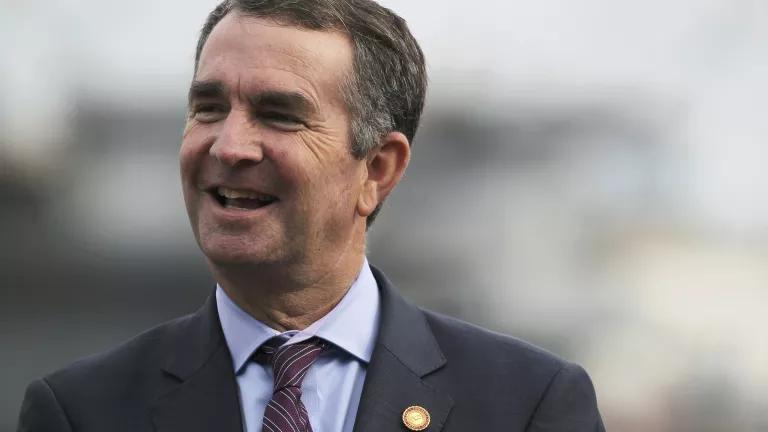Northam Puts Virginia's Climate Action into Gear

Nickolas Oatley/The Daily Press via Associated Press
Virginia's Governor Northam showed climate leadership at the Global Climate Action Summit today, which will help move Virginia and the nation forward on public safety though climate action. In doing so, Northam is also rightly repudiating the Trump administration’s destructive march into the past and its backwards coddling of the pro-pollution lobby.
Governor Northam’s announcement—to clean up pollution from Virginia’s transportation sector, and to eventually tackle methane pollution and acidifying oceans—is timely: Virginia has much to lose from further inaction, particularly along its already-imperiled coast. Just as important, Virginia has much to gain from decisive climate action, not just in public safety, but economically as well, particularly in the transportation and clean energy sectors. So while in D.C. the Trump administration continues its reckless spree of mindless handouts to polluters that put us and especially our grandchildren in the eye of climate chaos, Virginia will instead play an important part to lessen those public dangers.
While we look forward to examining the details of Northam’s announcement in the coming days, his administration is particularly smart to focus on two priority areas: vehicles and oceans. And depending on how and when it is deployed, an initiative to reduce methane pollution from dirty fossil fuel infrastructure could make meaningful climate progress as well.
Let’s take a look at the opportunities before us, and how Northam's team can best maximize the end results of today’s welcome announcement.
Cleaner Cars
To address the climate change already impacting Virginia, look no further than tailpipe pollution. Those emissions from cars and trucks are the main source of climate-changing carbon pollution in Virginia (in addition to the other pollutants from cars that dirty and smog up our air). So just as the Northam administration is wrapping up tackling carbon pollution from power plants, it is smart to turn its attention to climate-changing automobile pollution. And joining the Transportation & Climate Initiative is the best place to start. Learning from those leadership states, many of whom have rightly joined in pressing ahead with smarter state-level fuel efficiency standards, will surely lead to the best ways to clean up the fleet here in Virginia.
Doing so will not just be good for Virginia’s local air and reducing climate changing carbon pollution, it will also be good for Virginians’ pocketbooks, if we prioritize fuel efficiency and electric vehicle (EV) adoption. Virginia already got a jump on this front with Northam's recent move to install more EV charging stations. Tackling car pollution would also protect Virginia from the ill effects of another of Trump’s polluter handout to Big Oil, a move that will hurt Virginians at the pump, while also worsening our local air quality and climate change on the coast.
So instead of a Trumpian lurch backwards to sootier air and expensive gas-guzzling, Governor Northam is wise to drive forward instead, to a cleaner, safer, and cheaper transportation future.
Cleaner Oceans
Climate change already threatens Virginia’s bedrock fisheries and shellfish industries. One of climate change’s most dire impacts—ocean acidification from the uptake of excessive carbon dioxide into global waters—further imperils Virginia’s coastal economy. Those hazards need to be assessed in order to prevent them.
Thus Northam is correct to join the “Ocean Acidification Alliance” and then craft a plan to mitigate acidification-related damage to Virginia's economy. That way, Virginia can continue to take effective actions to lessen the carbon pollution that would otherwise further acidify the Atlantic Ocean.
Dirty Fuel Infrastructure
While we look forward to learning the details, Northam’s plan to clean up potent methane pollution from dirty fossil fuel infrastructure, as well as from landfills, could be a meaningful step, if the measure applies to existing and on-the-way infrastructure.
Because Virginia has experienced a fossil fuel infrastructure glut, having been on a decade-long gas plant building spree, despite the current oversupply of gas generation across the regional electric grid. Adding to that glut are three controversial pipelines proposed to cross Virginia, in those pipeline companies' ongoing search for out-of-state gas markets.
Despite this lack of need inside Virginia for additional fossil fuel infrastructure in the future (particularly when Virginia has so few gas wells of its own), it would make good sense to ensure that methane pollution is nonetheless reduced from all already-existing, under construction, and proposed gas infrastructure. Cleaning up these existing and proposed gas projects could prove particularly important as Trump, in yet another of his administration's endless handouts, attempts to rollback commonsense federal protections against wasteful methane leakage from gas projects.
Next Steps
The real work now begins, as the Northam administration puts these larger goals of cleaner cars, cleaner air, and cleaner oceans into concrete actions.
On cars, we hope Virginia moves forward with cleaning the air and saving dollars at the pump through more fuel efficient and therefore less expensive cars and EVs. For example, next door Maryland and others have already done so through the Clean Air Act’s Section 177 provision for state-level auto emissions standards. Virginia should be the first Southern state to do so as well.
On ocean acidification, once we know the specific risks to Virginia’s coastal economy, we hope to see sensible and tangible carbon reductions across Virginia to help address that significant threat.
On methane, we look forward to learning whether those commonsense requirements will apply to existing and proposed pipelines and compressor stations, to ensure actual methane pollution reductions actually occur in Virginia’s already-overbuilt gas sector. As a substantive, complementary action on reducing powerful greenhouse gas, the administration should build on success in reducing methane, to also phasing out the even more potent HFCs.
For today, though, Governor Northam’s climate and public safety leadership deserves celebrating, so that tomorrow, we can all get to work together on a safer, healthier, and more prosperous Virginia.

